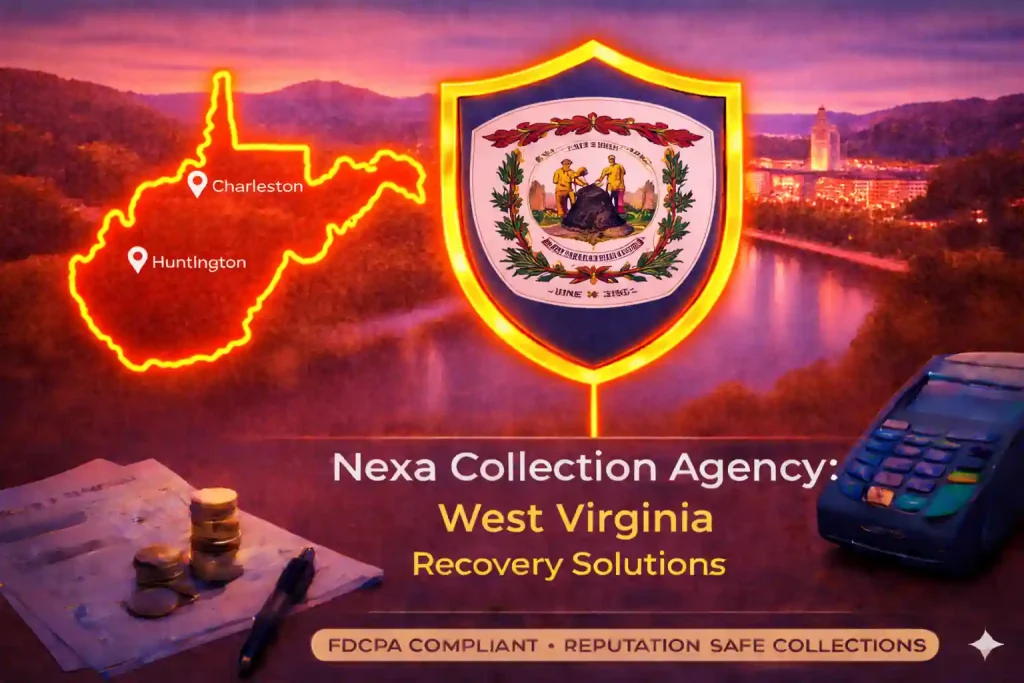In the Mountain State—from the industrial hubs of Charleston and Huntington to the growing tech and research corridors of Morgantown and the Eastern Panhandle—business is built on local trust. But in 2026, trust is being tested by a tightening regulatory environment. West Virginia is home to some of the most aggressive consumer protection laws in the country. With the WVCCPA providing statutory penalties that can exceed the debt itself and the state’s generous 10-year statute of limitations for written contracts, you don’t just need a collector; you need a compliance strategist. Nexa provides the “Mountain State Advantage,” leveraging high-impact mediation to secure your revenue while shielding your brand from the legal pitfalls of 2026.
Nexa provides 100% reputation-safe, equipped with all 50-state collections license, offering free credit reporting, free litigation/bankruptcy scrubs, and zero onboarding fees. Secure – SOC 2 Type II & HIPAA compliant.
Need a Collection Agency? Contact us
The West Virginia Legal Landscape
West Virginia rewards creditors who maintain clear documentation, but the state’s “Consumer Shield” is one of the thickest in the Appalachian region.
| Rule Category | 2026 West Virginia Standard | Nexa Strategy |
| Written Contracts | 10-Year Statute | We revive high-value B2B debt from as far back as 2016. |
| Oral / Open Accounts | 5-Year Statute | High-speed triggers via W. Va. Code § 55-2-6. |
| Wage Garnishment | 20% Cap (Consumer) | We account for the strict 20% limit for credit transactions. |
| WVCCPA Penalties | Up to $175,000 | Our workflow is hard-coded for total 2026 compliance. |
| Mechanic’s Liens | 100-Day Filing Window | High-speed demand triggers via W. Va. Code § 38-2-7. |
Critical West Virginia Rules for 2026:
-
The 10-Year “Golden Window”: Under W. Va. Code § 55-2-6, West Virginia offers a massive 10-year statute of limitations for written contracts. Nexa specializes in auditing “zombie” ledgers from 2018–2021 to find thousands in recoverable revenue that other agencies assume is expired.
-
The WVCCPA Compliance Shield: The West Virginia Consumer Credit and Protection Act is a “debt-killer.” Calling a debtor more than 30 times a week or contacting an employer can result in statutory penalties that wipe out your balance. Nexa’s 2026 workflow is strictly audited to ensure your business is never at risk.
-
The 20% Garnishment Floor: While federal law allows 25%, West Virginia law (§ 46A-2-130) limits garnishment to 20% of disposable earnings for consumer credit sales. We perform the “Mountain Math” to ensure your legal filings are profitable.
-
Medical Debt Transparency: Following the 2025 legislative push, West Virginia providers are now under higher scrutiny for price transparency. Nexa ensures your patient recovery follows all “fair billing” standards to maintain your hospital’s reputation and legal standing.
Cost-Effectiveness: The Nexa Advantage
-
Fixed-Fee Recovery ($15/account): Ideal for early-stage B2B and medical. Debtors pay 100% directly to you.
-
Contingency Fee Service (20%–40%): Performance-based recovery. No Recovery, No Fee.
Industries We Serve in West Virginia
-
Manufacturing & Logistics: B2B recovery for the chemical, steel, and automotive suppliers in the Ohio and Kanawha River valleys. We handle high-value freight brokerage and warehousing disputes.
-
Healthcare, Dental & Medical: 100% HIPAA-compliant. We manage patient balances across the WVU Medicine and CAMC footprints, utilizing professional mediation to avoid the “extraordinary collection action” pitfalls of 2026.
-
Energy & Natural Resources: Specialized recovery for coal, natural gas, and renewable energy service providers. We understand the complex billing cycles of the Appalachian energy sector.
-
Colleges & Universities: From WVU and Marshall to private colleges, we manage tuition recovery with a student-first mediation approach that preserves institutional reputation.
-
Accountants & CPA Firms: Recovery of professional service fees. We understand the “net-30” billing cycle and preserve client rapport through professional mediation.
-
Banks & Credit Unions: Expert handling of delinquent consumer loans using West Virginia’s 10-year judgment renewal window and aggressive bank levy filters.
-
Construction & Trades: Revenue recovery for HVAC and general contractors (Experts in W. Va. Code § 38-2 Mechanic’s Liens and the 100-day filing window).
Recent West Virginia Recovery Results
-
Charleston-Area Medical Specialty Group ($68,000): A multi-specialty group recovered this amount in 50 days using a 2026-compliant mediation strategy that avoided the legal risks of the WVCCPA.
-
Morgantown Tech Industrial Supplier ($42,000): Resolved a high-value unpaid industrial invoice in 24 days by utilizing West Virginia’s 10-year written contract statute to secure a pre-legal settlement.
Frequently Asked Questions (FAQ)
1. Is it true I can only garnish 20% of a paycheck in West Virginia?
Yes. For judgments arising from consumer credit sales or consumer loans, West Virginia Code § 46A-2-130 limits garnishment to the lesser of 20% of disposable earnings or the amount over 30x the federal minimum wage ($217.50/week).
2. Can I collect a debt that is 8 years old in West Virginia?
Yes. For written contracts, West Virginia allows for a 10-year window. Nexa can audit your older ledgers to find revenue that would be legally “dead” in almost any other state.
3. What happens if an agency violates the WVCCPA?
Under West Virginia law, a single violation can lead to a penalty of $1,000 per violation, which can be adjusted for inflation up to approximately $175,000. Nexa’s compliant workflow is designed to prevent these “debt-erasing” penalties.
Get Your Free West Virginia Recovery Analysis
Popular Cities:
- Morgantown
- Parkersburg
- Wheeling

